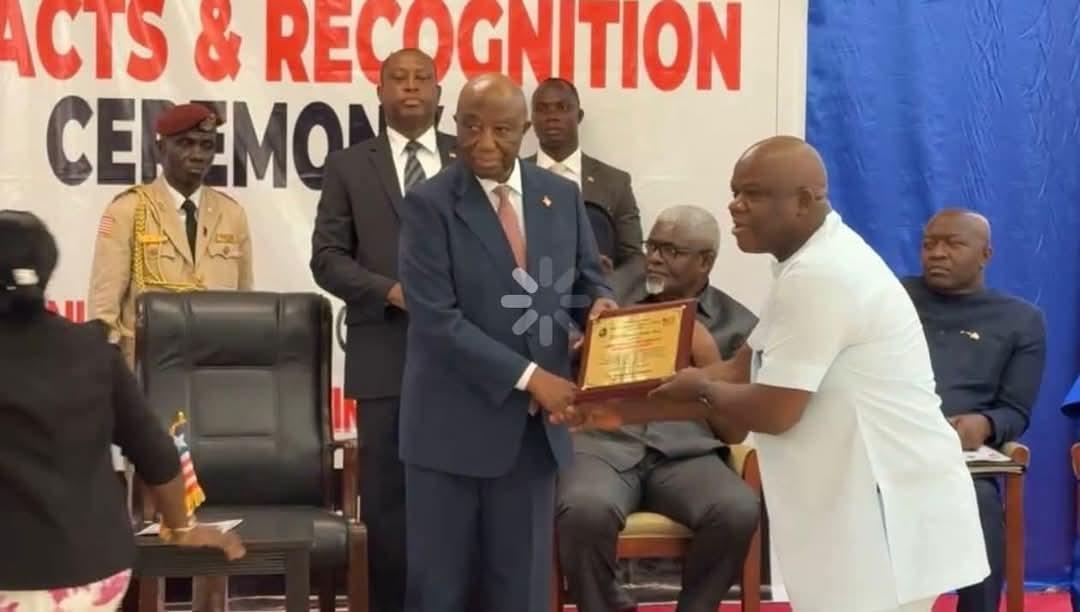Africa-Press – Liberia. In a moment of national spotlight, Christopher D. Sankolo, Director General of the Liberia Agriculture Commodity Regulatory Authority (LACRA), received a standing ovationThursday at the Ellen Johnson Sirleaf Ministerial Complex in Monrovia. The applause followed the announcement by President Joseph Boakai declaring Sankolo as the Number One Top Performing Public Entity Head for 2024/2025.
It wasn’t merely an award. It was a powerful acknowledgment of what is possible when vision, integrity, and results-driven leadership converge within the public sector. For many, the recognition is long overdue. For Sankolo, it is just the beginning of a long-term agenda to reform Liberia’s agricultural value chain from the inside out.
When Sankolo took over the leadership of LACRA in March 2024, the agency was struggling to meet even its most basic operational objectives. Mandated to regulate and promote Liberia’s key agricultural commodities, particularly cocoa and coffee, LACRA had been hampered for years by weak institutional capacity, poor infrastructure, minimal funding, and a lack of innovation.
Between 2022 and 2023, LACRA’s account balances never exceeded US$10,000, and its export records hovered at a mere 2,660 transactions. Perhaps most telling, the number of active exporters registered with the institution was only six — a sign of the diminishing confidence in its ability to deliver on its mandate.
Faced with these daunting statistics, Sankolo wasted no time initiating a series of bold, transformative reforms aimed at overhauling LACRA’s internal systems and reviving its external impact. One of the most impressive results of his leadership is the dramatic financial turnaround.
Upon his appointment, LACRA had only US$400 in its account. Today, the institution boasts over US$1 million in reserves, a milestone that has stunned both public officials and private sector observers. This rapid financial growth has been credited to disciplined fiscal management, the elimination of systemic leakages, and a strategic approach to increasing revenue from export activities.
Under his guidance, the number of registered exporters rose sharply from six to twenty-three in a single year, while the number of export transactions surged to an astounding 35,000 — an increase of more than 1,200 percent.
While the numbers tell a compelling story, it is the internal transformation of the agency that has made the most lasting impact. Sankolo understood early on that rebuilding the institution required more than financial figures; it demanded a renewed focus on staff welfare, accountability, and functionality.
Within months of assuming office, he procured two new 25-seater buses to address staff transportation needs, along with eleven Yamaha motorbikes for field operations, especially in remote farming areas. To ensure continuous power supply to the agency’s headquarters, a new 100-kilowatt transformer was installed, resolving long-standing electricity issues that had plagued LACRA’s operations. Simultaneously, office spaces were renovated, water supplies restored, and the agency’s security department underwent a full rebranding to reflect a new culture of professionalism and institutional pride.
Sankolo also worked to instill a culture of transparency, inclusivity, and performance within the agency. He introduced participatory decision-making practices, allowing staff from various departments to contribute ideas and innovations. Regular performance reviews were instituted to ensure that each department met its targets and maintained alignment with national agricultural development goals.
Perhaps most notably, he recruited and trained over fifty new quality control officers whose role is to monitor and verify the grade and condition of cocoa beans and other agricultural exports. Their work has been critical in restoring Liberia’s reputation in international commodity markets, where quality assurance is non-negotiable.
Beyond Monrovia, Sankolo has been a strong proponent of decentralization. Recognizing that agriculture is a national endeavor, he pushed for the renovation and reactivation of LACRA’s regional offices, ensuring they are well-staffed and equipped to provide support to farmers, cooperatives, and exporters at the local level.
From Bong County to Grand Gedeh, these offices are now playing an active role in mobilizing local producers, improving compliance, and expanding market access.
Internationally, Sankolo has made significant strides in reconnecting Liberia to global agricultural institutions. His leadership led to Liberia’s reentry into the Inter-African Coffee Organization (IACO) in November 2024, ending years of isolation from a key continental body.
The move restored Liberia’s voice in regional coffee policy discussions and opened new doors for technical partnerships, market intelligence, and joint initiatives across Africa.
President Boakai, in presenting the award to Sankolo, did not hide his admiration. The president described Sankolo’s performance as a blueprint for how public institutions should operate, praising him for his leadership, innovation, and unwavering commitment to national service.
President Boakai emphasized that LACRA’s transformation stands as a testament to what determined leadership can accomplish in Liberia’s journey toward institutional reform and economic revitalization.
For Sankolo, the work is far from over. Plans are already underway to digitize LACRA’s export licensing systems, enhance its monitoring and traceability frameworks, and introduce reforms that make the agency more efficient and accountable. A farmer traceability system is also being developed, which will allow international buyers to track the origin and journey of agricultural goods, thereby increasing market value and ensuring compliance with global trading standards.
What Christopher Sankolo has achieved in just over a year is not merely the revival of a struggling institution. He has redefined what it means to serve the public with integrity and effectiveness. In doing so, he has brought renewed energy to Liberia’s agricultural sector and set a high bar for leadership across government.
For More News And Analysis About Liberia Follow Africa-Press






